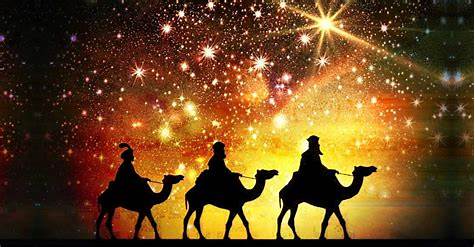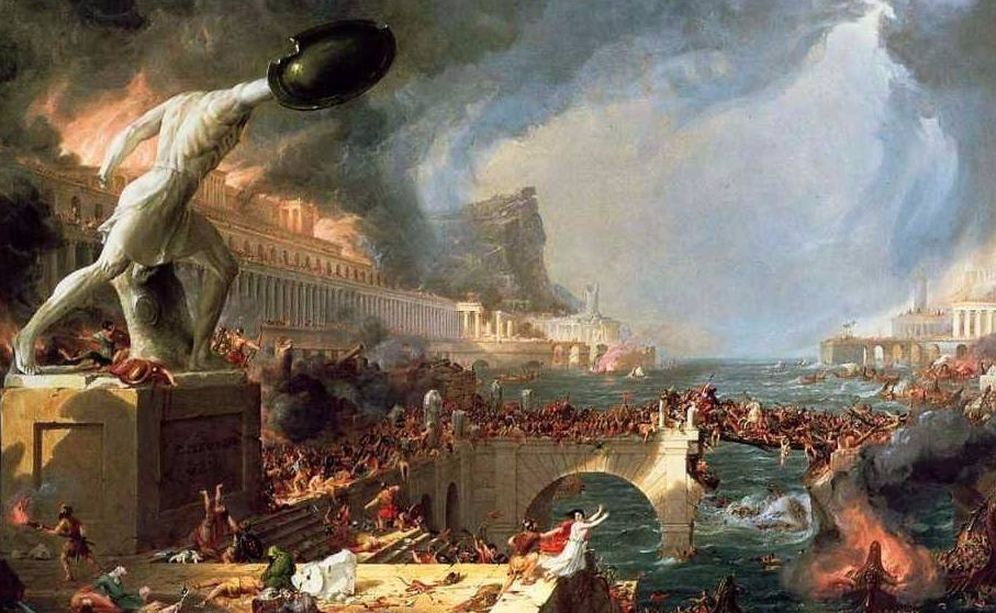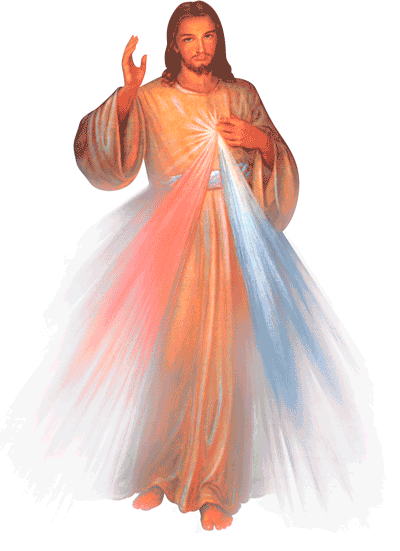
How to be or become a follower of Jesus Christ in the world and in your situation« Where is the born king of the Jews? We have seen his star rise, and have come to worship him »
In this passage I find confirmation of the reasons why I thank God for having created me, made me a Christian, and preserved me in these 81 years, which I have just completed, and especially for having allowed me to escape all physical and moral dangers, often serious and even with some diseases and suffering, which is natural.
On the day of the Epiphany, the manifestation of the Lord, in this passage the evangelist Matthew, who was a person accustomed to managing and making accounts, precisely exposes the passages of the Holy Bible where the birth of Jesus Christ is announced, and his epiphany (manifest).

Suggestive image of the Sages coming from the East to worship the King.
Obviously each one with its own caravan, with servants and armed escort
It is clear that the Holy Bible is essentially the history of the Jewish people, of how the first monotheistic religion born in Egypt spread, and of how the Jewish people occupied the promised land, and the subsequent historical events. As such it contains and narrates even the most scandalous things with realism, according to the spirit and knowledge of those times.
I repeat here that the most important parts for us Christians, as I wrote above, are the passages of the Hebrew Bible that announce the birth and preaching of Jesus Christ. For us, everything is aimed at this.
In the New Testament the evangelists promptly report, with small differences, the facts of the birth of Christ. In fact, the aspects of historical reality and the historicity of the Synoptic Gospels are undoubtedly indisputable.
The facts are faithfully reported on the basis of the testimonies of those who saw them, and also of those who, like the apostles, were involved in the events narrated.
I believe and urge others to study and read up, and to live a life that prepares the person to receive the gift of faith.
THEREFORE I URGE EVERYONE TO READ THE GOSPEL AND IF ONE DOES NOT UNDERSTAND IT, TO ASK FOR ADVICE FROM THOSE WHO KNOW MORE THAN US. BUT LET US REMEMBER TO ALWAYS THINK WITH OUR HEAD, in conscience and knowing the facts.
Remaining in one's own state and in one's ordinary situation, I would urge those who do not yet do so to try to use some of the time available to try to form their own spirituality. Even in this era in which relativism and practical atheism triumph, one can thus receiving the gift of FAITH from God!!
WE THEREFORE BELIEVE IN JESUS CHRIST AND IN OUR SUPERNATURAL DESTINY
HISTORICAL NOTE:
As I have already said on numerous occasions, I repeat here some things that I consider fundamental from a historical and human point of view.
- The parents of the Virgin Mary were very rich people with a very high social position.
- The Virgin Mary had been raised by the women of the temple and she had studied. She was a person of respect, as we deduce from the fact that it is narrated in the wedding at Cana, where SHE had been invited and consequently also Jesus and HIS disciples.
- Mary and Joseph were both of royal descent, from the lineage of King David.
- St. Joseph was probably NOT a simple carpenter. In the early Latin translations he is referred to as FABER (builder) and not LIGNARIUS (carpenter). CFR. Life of Jesus Christ by the Abbey Ricciotti.(º)
In some fictional films, which claim to be historical, some fools even imagined and depicted him, Joseph, as being in financial difficulty as an unemployed man! - The symbolic emergency birth of the baby Jesus in a hut is intended by God as a symbol, as the Joseph's relatives home was in Bethlehem.
- The Three Kings DO NOT visit Jesus in the hut, the stable with the ox and the donkey, but in the HOUSE, as said here. It was certainly the home of Giuseppe's family. The most important painters of sacred art represent the scene in a house, as from the Gospel story.
The census ordered by Emperor Caesar Octavian Augustus
The census in the Gospel is said to have taken place when a Roman procurator, named Quirinius, was governor of Syria.
Modern historical research has determined that for reasons of expediency the census instead took place 6 (six) years before what was scheduled.
In fact, Jews used to be registered in the family's city of origin. It was therefore brought forward only for the Jews, by six years, to avoid confusion with the rest of the Empire.
Year 1 begins for us 753 years after the foundation of the URBIS which is the year in which the census of the rest of the empire was carried out. It should actually have been set six years earlier, when the census took place in Palestine, 747 years after the founding of Rome.
PAUPERISM, a very common ideology in the Catholic Church, was born in particular conditions, notably in the climate of plagues and famines that followed the complete destruction of the city of Rome by the vandals of GENSERICK and the decline and fall of the Roman Empire. It was due to the need to understand and remedy towards the distributism the situation of common people in the disastrous economic conditions that drastically reduced the population in Europe by the fall of the Empire.
Pauperism (the pauperist attitude and the distributist conception of the economy) still lasts today and is reported - sometimes incorrectly - as a consequence of a complex of factors of various nature, such as the lack of resources or capital, wars, famines, etc. .. which cause serious situations of economic depression which extend to large sections of the population.

The sacking of Rome by the Vandals AD 455
(º)Giuseppe Ricciotti (Rome, 27,February 1890 – Rome,22 January 1964)
was an Italian priest, biblical scholar and archaeologist, scholar of the history of Christianity.
He has been also a military chaplain and silver medalist for valor in the First World War.
Works by Giuseppe Ricciotti (partial list)
I have read part of his Life of Jesus Christ, Rome, Rizzoli, 1941. Useful readings for a scientific, less approximate and non-sentimental vision of the reality of the facts narrated.
- From the Bible: literary anthology, Bologna, Nicola Zanichelli Editore, 1922.
- The book of Jeremiah, Turin 1923.
- The Lamentations of Jeremiah, Turin, Marietti, 1924. The book of Job, Turin 1924.
- Saint Ephrem the Syrian. Biography, writings, theology, Turin, Marietti, 1925. S. Efrem Siro.
- Hymns to the Virgin translated from Syriac, Turin 1925.
- St. Aphraates or the wise Persian: the most beautiful pages translated from Syriac, Milan 1926.
- The Song of Songs, version of the Hebrew text with introduction and commentary, Turin, Società Editrice Internazionale, 1928.
- The Syriac Apocalypse of Paul, 2 vols., Brescia, Morcelliana, 1932
- Introduction, translation and commentary The cosmology of the Bible and its transmission up to Dante History of Israel, 2 vols., Turin, Società Editrice Internazionale
- From the origins to the exile, 1932.
- From the exile to 135 AD, 1934.
- Catholic Rome and the Christian East, Florence, Libreria Editrice Fiorentina, 1935.
- Bible and non-Bible, Brescia, Morcelliana, 1935.
- Hiram's construction site. Materials for spiritual constructions, Turin, Società Editrice Internazionale, 1936.
- Catholicism, Florence, The New Italy, 1939.
- Christianity, Florence, The new Italy, 1939.
- Course on religious history of the Christian East, lessons collected by A. Soldano, Rome, University Editions, 1940.
- Life of Jesus Christ, Rome, Rizzoli, 1941.
- The religion of Christ. Religion text for middle schools, Verona, Arnoldo Mondadori Editore, 1943.
- Jewish Questions, Rome, Ave, 1945.
- Paul the apostle. Biography with critical introduction and illustrations, Rome, Coletti, 1951.
- The trial of Christ. Booklet. Music by Ennio Porrino, 1951.
- The era of the martyrs. Christianity from Diocletian to Constantine, Rome, Coletti, 1953.
- Emperor Julian the Apostate, Milan, Arnoldo Mondadori Editore, 1956.
- The Bible and modern discoveries, Florence, Sansoni, 1957.
Holy Gospel of Jesus Christ Matthew 2,1-12.
«Where is he who has been born king of the Jews? We have seen his star rise, and we have come to worship him."
When King Herod heard these words, he was troubled, and all Jerusalem with him.

Do not be afraid! the mercy of Jesus is INFINITEHaving gathered all the high priests and scribes of the people, he inquired from them about the place where the Messiah was to be born.
They answered him, "In Bethlehem in Judea, for thus it is written through the prophet:
And you, Bethlehem, land of Judah, are indeed not the smallest capital of Judah: for from you will come a leader who will shepherd my people Israel.
Then Herod secretly called the Wise Men and asked them to tell him exactly when the star had appeared.
and he sent them to Bethlehem exhorting them: "Go and inquire carefully about the child and, when you have found him, let me know, so that I too may come and worship him."
Having heard the king's words, they departed. And behold, the star, which they had seen at its rising, preceded them, until it came and stopped above the place where the child was.
When they saw the star, they felt great joy.
When they entered the house, they saw the child with Mary his mother, and they fell down and worshiped him. Then they opened their treasure chests and offered him gifts of gold, frankincense and myrrh.
Having been warned in a dream not to return to Herod, they returned to their country by another route.
UNOFFICIAL TRANSLATION OF THE ITALIAN VERSION
CTRL + increases page dimension
CTRL - decreases



